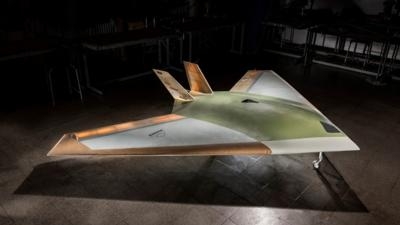Mon, Dec 18, 2017
BAE Systems And The University Of Manchester Seek To Change The Future Of Aircraft Design
BAE Systems and The University of Manchester have successfully completed the first phase of flight trials with MAGMA – a small scale unmanned aerial vehicle (UAV) which will use a unique blown-air system to maneuver the aircraft - perhaps leading to stealthier aircraft designs in the future.

The new concept for aircraft control removes the conventional need for complex, mechanical moving parts used to move flaps to control the aircraft during flight. This could give greater control as well as reduce weight and maintenance costs, allowing for lighter, stealthier, faster and more efficient military and civil aircraft in the future.
The two technologies to be trialled first using the jet-powered UAV, MAGMA, are:
Wing Circulation Control, which takes air from the aircraft engine and blows it supersonically through the trailing edge of the wing to provide control for the aircraft
Fluidic Thrust Vectoring, which uses blown air to deflect the exhaust, allowing for the direction of the aircraft to be changed.
The flight trials are part of an ongoing project between the two organizations and wider long-term collaboration between industry, academia and government to explore and develop innovative flight control technology. Further flight trials are planned for the coming months to demonstrate the novel flight control technologies with the ultimate aim of flying the aircraft without any moving control surfaces or fins. If successful, the tests will demonstrate the first ever use of such circulation control in flight on a gas turbine aircraft and from a single engine.
"The technologies we are developing with The University of Manchester will make it possible to design cheaper, higher performance, next generation aircraft," said Clyde Warsop, Engineering Fellow at BAE Systems. "Our investment in research and development drives continued technological improvements in our advanced military aircraft, helping to ensure UK aerospace remains at the forefront of the industry and that we retain the right skills to design and build the aircraft of the future.”
"These trials are an important step forward in our efforts to explore adaptable airframes," said Bill Crowther, a senior academic and leader of the MAGMA project at The University of Manchester. "What we are seeking to do through this programme is truly ground-breaking.”
Additional technologies to improve the performance of the UAV are being explored in collaboration with the University of Arizona and NATO Science and Technology Organization.
(Image provided with BAE news release)
More News
From 2023 (YouTube Version): Legacy of a Titan Robert (Bob) Anderson Hoover was a fighter pilot, test pilot, flight instructor, and air show superstar. More so, Bob Hoover was an i>[...]
Get The Latest in Aviation News NOW on Instagram Are you on Instagram yet? It's been around for a few years, quietly picking up traction mostly thanks to everybody's new obsession >[...]
Aero Linx: B-52H Stratofortress The B-52H Stratofortress is a long-range, heavy bomber that can perform a variety of missions. The bomber is capable of flying at high subsonic spee>[...]
Altimeter Setting The barometric pressure reading used to adjust a pressure altimeter for variations in existing atmospheric pressure or to the standard altimeter setting (29.92).>[...]
"Knowing that we play an active part in bettering people's lives is extremely rewarding. My team and I are very thankful for the opportunity to be here and to help in any way we ca>[...]
 Classic Aero-TV: Remembering Bob Hoover
Classic Aero-TV: Remembering Bob Hoover ANN FAQ: Follow Us On Instagram!
ANN FAQ: Follow Us On Instagram! ANN's Daily Aero-Linx (05.15.24)
ANN's Daily Aero-Linx (05.15.24) ANN's Daily Aero-Term (05.15.24):Altimeter Setting
ANN's Daily Aero-Term (05.15.24):Altimeter Setting Aero-News: Quote of the Day (05.16.24)
Aero-News: Quote of the Day (05.16.24)



